

Meet Catelyn Scholwinski, SMM Director, and Stephanie Watson, SMM Vice Director, during an hour-long webinar where we’ll chat about how they got to where they’re at today, their advice for young professionals, and their predictions for our industry. Come ready to ask questions and get to know who is leading the SWANA SMM Technical Division!
SWANA has Technical Divisions that focus on specific solutions for the waste industry. Sustainable Materials Management (SMM) is a very important one. The Division has an upcoming event that is a great opportunity for young professionals interested in more sustainable reuse, recycling, and resource management.
SCS’s own Kelli Farmer is SWANA’s SMM Young Professional Representative. If you want to speak with the men and women on SCS’s Sustainable Materials Management teams, please get in touch with us at .
SCS Engineers is leading the charge to sustainable materials management through innovative policies, programs, and infrastructure that increase diversion, reduce contamination, recycle more materials, and manage costs. SCS offers comprehensive services to assist in achieving your SMM goals and reducing your carbon footprint. We offer technical expertise and the financial, regulatory, and educational skills to develop cost-effective and sustainable programs.
Meet Catelyn Scholwinski, SMM Director, and Stephanie Watson, SMM Vice Director, during an hour-long webinar where we’ll chat about how they got to where they’re at today, their advice for YPs, and their predictions for our industry. Come ready to ask questions and get to know who is leading the SWANA SMM Technical Division!
SWANA has Technical Divisions that focus on specific solutions for the waste industry. Sustainable Materials Management (SMM) is a very important one. The Division has an upcoming event that is a great opportunity for young professionals interested in more sustainable reuse, recycling, and resource management.
SCS Engineers is leading the charge to sustainable materials management through innovative policies, programs, and infrastructure that increase diversion, reduce contamination, recycle more materials, and manage costs. SCS offers comprehensive services to assist in achieving your SMM goals and reducing your carbon footprint. We offer technical expertise and the financial, regulatory, and educational skills to develop cost-effective and sustainable programs. SCS’s own Kelli Farmer is SWANA’s SMM Young Professional Representative.
If you are interested in an environmental career that can impact climate change for the good – this is it! Many types of positions are open now.
Join SCS Engineers professionals at “REimagine California” the 47th Annual Conference & Tradeshow of the California Resource Recovery Association (CRRA), August 13-16, at the Hyatt Regency San Francisco Airport in Burlingame, CA.
Each year, the CRRA organizes one of the most comprehensive and informative conferences dedicated to recycling and sustainable materials management in California and beyond. The Annual Conference and Tradeshow attracts over 600 individuals annually and showcases some 30 sessions with over 100 industry experts as presenters. The conference includes
This year’s event will be a hybrid, available live as well as online via streaming. All speakers will be presenting live from Burlingame.
Click for more conference details and registration information
SCS Engineers welcomes Project Manager Jeff Phillips to the Clive, Iowa office. Jeff works with a growing number of solid waste management clients interested in integrating sustainable materials management into their solid waste master plans. The practice is widely known as Integrated Solid Waste Management, ISWM.
Jeff Phillips comes to SCS with over two decades of designing and implementing ISWM programs. His expertise includes a comprehensive list of individual tasks and services, including facilitating strategic planning and consensus-building sessions, performing waste and recycling industry market analyses, developing and presenting comprehensive financial plans to solid waste agencies, identifying, authoring, and managing federal and state grants. He also designs, performs, manages waste characterization analyses, authors and produces videos for training and education purposes, and is involved in community outreach events for solid waste agencies, city councils, and the public.
“Jeff provides innovative approaches to develop and strengthen programs and operations in Iowa,” said Christine Collier, senior project manager. “He fits right into our SCS philosophy of ensuring client success.”
Jeff is an active member of the Solid Waste Association of North America and the Iowa Society of Solid Waste Operations, where he previously served on the Board of Directors and Conference Planning Committee. He earned a Bachelor of Arts, Geography, and Environmental Studies from the University of Iowa.
An American Public Works Association (APWA) publication,
No single waste management approach is suitable for managing all materials and MSW streams in all circumstances. The USEPA hierarchy places emphasis on reducing,
reusing, and recycling as key to sustainable materials management. Citizens and elected officials are often surprised how technically complex solid waste management is, and once aware of the basics they better understand the associated costs. Responsible Solid Waste Management with colorful infographics and easy-to-grasp explanations, helps readers understand solid waste management from beginning to end.
The concept of integrated solid waste management is increasingly being used by states and local governments as they plan for the future. This management practice includes the source reduction of certain MSW streams and the recovery of generated waste for recycling or composting. It also includes environmentally sound management through combustion with energy recovery and landfilling practices that meet current standards or newly emerging waste conversion technologies.
Available on the APWA website or reach Michelle Leonard (co-author) or an MSW engineer nearby contacting SCS Engineers at .
Learn more about Sustainable Materials Management here.
Los Angeles County Public Works – Environmental Programs Division is receiving a 2019 Food Recovery Challenge Award from the United States Environmental Protection Agency – USEPA this year. The national recognition is for the County’s substantial increase in food recovery and sustainable materials management. EPA’s data-driven awards are based on the information submitted in the Sustainable Materials Management – SMM, Data Management System, and reflect percent changes comparing an organization’s data to the previous year’s data.
LA County Public Works serves 88 cities and a population of more than 10 million people. The County is continually pursuing ways to make its communities more resilient by identifying new SMM actions to address greenhouse gases, waste generation, and pollution.
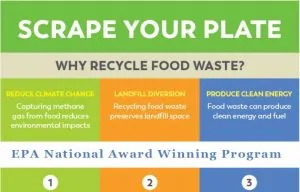
Public Works, in collaboration with the Sanitation Districts, made use of the existing anaerobic digestion infrastructure to convert 13,700 pounds of food waste to electricity. Worm composting bins divert an additional 1,200 pounds of food waste and another 340 pounds were source reduced by improved planning by kitchen staff. All of these diversion tactics reduce greenhouse gas emissions.
Getting employees and visitors to separate food waste properly is always a challenge. The project team, including SCS Engineers, significantly reduced cross-contamination by increasing on-site signage and peer-to-peer outreach. Signage, easily updated with user-friendly graphics makes a difference. The team further encourages new social behaviors with an educational video.
Despite the closing of recycling programs in other cities due to the pandemic, LA County Public Works is now expanding its program to recycle other types of organic waste, including food-soiled paper.
Preventing and reducing food waste has a tremendous impact and positive benefits for our nation. Food is a valuable resource. Efforts to reduce food waste and ensure excess food doesn’t go to waste are needed now more than ever. Participants in EPA’s Food Recovery Challenge in 2019 prevented or diverted over 815,000 tons of food from entering landfills or incinerators, saving participants up to $42.3 million in avoided landfill tipping fees. The EPA provides many helpful tools on its website.
Learn more about SCS Engineers’ Sustainable Materials Management and Composting programs at SCSEngineers.com.
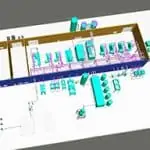
SCS is receiving the Gold Business Achievement Award for a Large Environmental Firm, for outstanding business performance in 2019. We largely attribute our organic growth to our clients interested in Sustainable Materials Management (SMM) and renewable natural gas (RNG) services. Our SMM programs increase our clients’ solid waste management efficiencies, reduce waste, and support sustainable recycling, and our design and design/build facilities convert landfill gas, dairy digester gas, and wastewater treatment plant digester gas to RNG. In addition, SCS’s Geographic & Practice Area Expansion initiative in 2019 enables us to expand our professional engineering and consulting services for liquids management, wastewater treatment, and emerging contaminants from new offices in the South, Central, and Midwest regions of the United States.
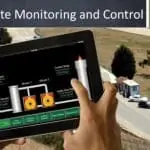
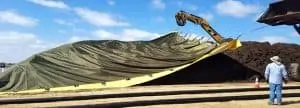
The Environmental Services Division of the city of San Diego, in collaboration with SCS Engineers, is receiving the Composting Project Merit Award in recognition for the composting operation at the Miramar Landfill in San Diego. In collaboration with the City, SCS designed an innovative covered Aerated Static Pile (ASP) composting system that will divert 100,000 tons per year of organic waste from the landfill. The ASP became operational in August 2019 and will compost 40,000 tons per year into useful by-products (and has capacity for an additional 20,000 tons). It provides an enhanced stormwater control system, and will eventually run on renewable energy generated from the landfill. According to the StopWaste.com calculator, the upgrade reduces greenhouse gas emissions by the equivalent of removing 19,015 cars from the road.
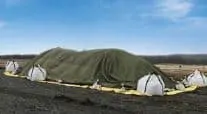
In addition, the recent announcement of SCS’s ASP Composting Pilot Program is making headlines. SCS owns a covered ASP compost system that is mobile and can be set-up on sites within an area of 50 feet by 100 feet, or less. In the covered ASP compost system, process and odor control is pro-active with a shorter composting period. Pilot tests allow waste managers to assess composting and to see if it is the right fit for their situation. The ASP system processes material batches in two months. Additional batches or “recipes” can test in 2-month intervals.
“Managing air, water, and soil pollution prevention are driving state and local regulations,” said Bob Gardner, a Senior Vice President of SCS Engineers. “Offsetting as much of the cost by improving operations, lowering energy consumption, and switching to renewable energy resources is critical to our clients.”
About SCS Engineers
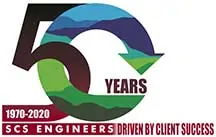
Our technologies and programs are finding footholds in the agricultural, industrial, and manufacturing sectors as municipalities and companies aim to reach climate change goals without passing all of the expense to consumers. SCS clients entrust us with the management of more than 35 million metric tons of anthropogenic CO2e greenhouse gases every year. We collect and beneficially use or destroy enough to offset greenhouse gas emissions from 7.4 million passenger cars annually.
Many schools and school districts are prioritizing a shift toward zero waste and sustainability. However, learning to manage material resources on-site in a more sustainable manner presents operational and monetary challenges. Learn the benefits and steps to plan a financially sustainable program from Tracie Bills of SCS Engineers.
Tracie creates realistic approaches which allow for flexibility while maneuvering the unique challenges that occur. She takes you step-by-step through building a successful program and refers to established efforts such as in the City of San Jose that already have established zero waste programs in their schools.
Read the article by clicking here.
Waste360 and the Environmental Research & Education Foundation (EREF) plan to deliver a conference program that is more technical, more innovative and more essential to you than ever before. Get ready, look who’s also back!
See the SCS Engineers roundup of presentations at the Global Waste Management Symposium by clicking here.
The Pennsylvania Department of Environmental Protection (DEP), Bureau of Waste Management, has awarded SCS Engineers (SCS) a contract to provide recycling and organics management technical assistance to local governments throughout the state. Brent Dieleman, SCS’s Project Manager, has years of experience administering these types of programs for the Solid Waste Association of North America.
Pennsylvania ratified “Act 101” in 1988 to manage waste and promote recycling across the Commonwealth. The DEP developed the Recycling Technical Assistance Training Program to help local governments comply with Act 101 by improving and expanding their collection and diversion programs. SCS will help administer and provide technical assistance to this Program. The comprehensive support provides for curbside and drop-off recycling programs, solid waste planning, public education, materials processing, equipment, technical training, environmental protection programs, and organics management.
Additionally, local governments can apply for technical assistance, up to $7,500 per applicant, to help expand and improve their recycling and organics management systems. SCS will work with applicants to assess their needs and refine the scope of their project. Once DEP approves a technical assistance project, SCS will then provide specialized, tailored training to each recipient.
SCS will help each grant recipient address the unique issues and challenges facing their program including, composting, collections, incentive-based programs such as pay-as-you-throw, and siting of new facilities. SCS anticipates providing technical assistance for up to 30 local governments annually.
DEP is tasking SCS with helping them find ways to further promote the Program across the Commonwealth and enable local governments to benefit from it. SCS anticipates presenting the initiative to local landfill owners and operators at a seminar in Harrisburg, Pennsylvania on June 9, 2017.
“In recent years Pennsylvanians have recycled nearly 17 million tons of waste, which removed almost 16 million tons of carbon dioxide emissions from the air. That is equivalent to saving the electricity used in 2.18 million American homes per year or taking 3.34 million passenger vehicles off the road for one year,” said Brent Dieleman. “We’re facilitating the DEP to help local governments efficiently expand their recycling programs.”